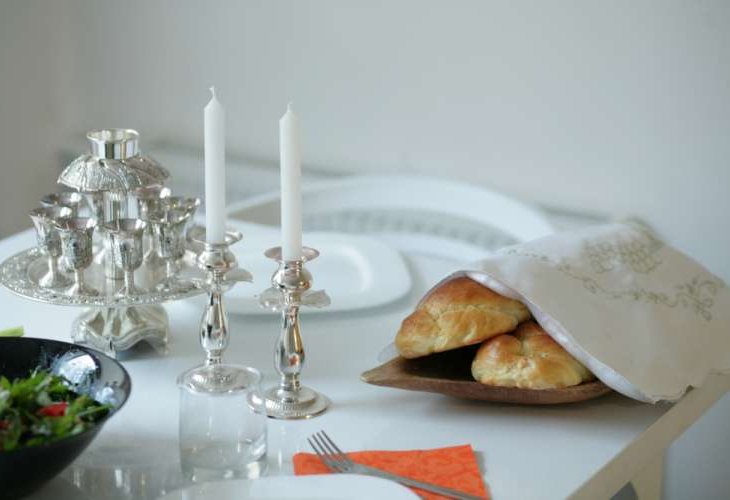Rabbi Shimshon Wekshtok: "I Bring the Shabbat Table to the Most Afflicted Departments"
How do you create a Shabbat atmosphere in hospitals? How did a Shabbat table with Kiddush inspire a Jew to return to observing Shabbat properly? And when did a trip to Beilinson take 6 minutes? Rabbi Shimshon Wekshtok brings the Shabbat table into patients' rooms and experiences unbelievable stories.
 (Photo: shutterstock)
(Photo: shutterstock)Omer gently moved the curtain, blushing with self-consciousness. He peeked into what was happening behind his neighbor's screen in the room. An elegant Shabbat table was proudly placed in the center of the room, a kiddush cup on a white linen cloth, challahs with a delicate fragrance of *Shabbat*, warmth and love, and above all, two *Shabbat* candles illuminating the hospital's gray room.
At that moment, this small yet significant table appeared to him as a beacon of faith, a small island of stability amidst the endless sea of pain. Four cubits of personal space within the public domain of thousands of patients. It resembled two departments: a department of pain, shots, respirations, and chemotherapy treatments. And a department of light within the darkness, of a heavenly, sublime *Shabbat* meal that made one forget the noise of the surroundings, a prestigious separate hosting unit among other patients, and a feeling of rising above all surrounding difficulties.
Tears welled in his eyes, and another fell. Finally, he burst into tears.
The man who made Omer burst into tears is Rabbi Wekshtok.
The Table That Brought Back to Roots
"It was at the beginning of my path," Rabbi Wekshtok shares with us. "A relative of mine had a sick child. Many times, I went to visit him and inquire about the family's well-being. Back then, decades ago, unlike today, there weren't many charity organizations distributing food. I especially felt the absence of something crucial for the hospitalized - a Shabbat table. A real Shabbat table in every room of a Sabbath-observant Jew. A table that would offer them weekly emotional respite. Just to feel Shabbat even in the hospital. My relative always complained that what hurt him most was not being able to feel the true Shabbat atmosphere in the hospital.
"For that, I connected with the philanthropist Rabbi Chaim Fisher, of blessed memory, then chairman of the 'Refuah V'Chaim' association. That's where it all started. We began creating the platform for food distribution in hospitals, and we started caring for the physical additions that ease the patients and their families.
"Years passed, and Rabbi Fisher fell ill with a serious illness. Every *Shabbat*, I would bring him a *Shabbat* table, a white cloth, two candles, a challah cover, a salt shaker, a real silver kiddush cup, with *Viznitz* aromatic challahs at the top of the set. Across the curtain was hospitalized a secular woman suffering from a similar illness. The common denominator was their desperate condition. Almost all hope was lost.
"On one Friday evening, I entered with the fragrant challahs and my famous table. A trail of airy *Shabbat* scent wafted down the corridor. I'm walking between the beds, seeking to bless more Jews and improve their situation. Among others, I asked Omer, the husband of the dying sick woman, if he wanted challahs and a table. He responded with a firm no. For many years, he did not observe *Shabbat*. He doesn't even know what it is, and he's not interested in learning. Here? In a hospital, to observe *Shabbat*?".
 (Photo: shutterstock)
(Photo: shutterstock)Rabbi Wekshtok describes what he had the privilege to witness.
"In the midst of *Shabbat*, at the peak of the pain. In a place where life and death intersect, where one reaches new heights in recognizing man’s inability to control his life. It all returned to him. The kiddush of his father, the candles of his grandmother, the *Shabbat* songs he once heard. It all pierced, cut, and directed his soul to a world of nobility and sanctity. Here, he couldn’t control himself anymore and burst into uncontrollable tears. Not just tears, but the tears of a child longing for his father, tears of true purity cleansing every consumed part of the body. A cry of pain over something real that he missed. Crying that ignites the heart. A lament that brings the soul to reconsider its path.
"In the oncology department of Tel Hashomer's extensive building, a place where one understands there is a higher power steering all circumstances, a miracle happened. The stone heart of a child captured couldn’t withstand the songs full of yearning, full of emotion. The Jewish soul didn’t give Omer rest against the overflowing spirit of the Jew at the end of his life, celebrating the *Shabbat* meal as if nothing had happened. He decides to taste the flavor of *Shabbat*, joining the kiddush and the *Shabbat* meal. Now something new was born. Something unexpected – in the illuminated room, Omer and the Hasidic student sat 'side by side'. Two separate worlds, two different opinions, yet one Creator of all worlds connected them, bringing him to observe *Shabbat*, for the first time in his life". For the following *Shabbat*, he already contacted to be added to the list of recipients of a *Shabbat* table and challahs.
"A few weeks later, Omer's wife passed away. It was on Thursday, and on Friday I came to visit and console him", Rabbi Wekshtok recounts. "I traveled to Ramat Aviv and knocked hesitantly on the door. Omer opened the door widely, and I planned to see a house full of mourners. I was surprised; the house was empty of people. The place was clean of visitors, no one entered or left. Alone and desolate, Omer remained in the world, and I knew that a special mission was upon me at these critical moments.
"I found Omer broken, crushed, and overwhelmed with his wife's treatment period. But a spark of Judaism glowed within him. He began to understand the true meaning of life, the purpose of everyone, and the right path he should take from now on.
"I sat with him for several hours, comforting him with kind words, showering him with comforting and uplifting words. At the end of our conversation, Omer showed me around his home. He showed me the candlesticks that rusted from disuse, the menorah inherited from his grandfather, and... the etrog box. The etrog box of his father, he chose to give me as a gift: 'Take it, it's yours. I have nothing to do with it'. I took the etrog box, but in my heart, I kept the reason why I agreed to take it.
"On the holiday of Sukkot, the box that had turned black over the years was cleaned and thoroughly renovated by a silversmith. On the eve of Sukkot, I went up to his home in Ramat Aviv, equipped with the etrog box and... a splendid etrog. I brought him the four species and an etrog in his father’s etrog box. We closed the circle".
Shabbat Table in the Hospital
The activity is focused on two tracks. First, three days a week, I and my partner in this mission, Rabbi Aharle Yekter, distribute packages of cookies, cheese cakes, and various treats to patients in medical centers. Towards *Shabbat*, the second and largest project begins: distributing *Shabbat* tables in every room where a Torah-observant Jew resides and wishes it.
"Rabbi Wekshtok revolutionized the *Shabbat* atmosphere in hospitals", one of the patients still being treated in the oncology department of Tel Hashomer told me. "It's amazing," summed up another patient. "In the hospital, all you have is the smell of blood, stifling air of treatments, and the heavy burden of pain. When Friday arrives, we all want to feel *Shabbat*. To experience a piece of joy, a glimpse of serenity in the ocean of suffering. And Rabbi Wekshtok allows us to experience one day a week of mental peace and tranquility".
We try to grasp the uniqueness of the project and discover how much precise planning is involved. "The tables are specially made to fit the patient's room size. They are foldable, user-friendly, and comfortable. The table is shared with a high-quality white cloth and a real silver kiddush cup. On the table are two *Shabbat* candles and challahs emitting the *Shabbat* aroma spreading throughout the hospital. That's it". However, this 'that’s it' requires the transportation of several vehicles between several hospitals during the busiest time, the eve of *Shabbat*.
Yet Rabbi Wekshtok doesn't shy away. Even when the activity involves tremendous difficulty, even when suddenly left without a volunteer driver, he doesn't lose his composure. Instead, he starts looking for a solution to the problem. His problem? It's a problem of all Israel. "How can the sick of Israel sit without a proper *Shabbat* table?" he asks-answers himself.
During the conversation (on a Wednesday), his phone rang after just one ring. On the line, another Jew is planning to spend *Shabbat* in the hospital and wants to ensure that this wonderful table will also reach him. "What do you think? This Jew will get my visit even before *Shabbat* ..." meaning he will receive a bounty of delicacies and treats before *Shabbat*.
 (Photo: shutterstock)
(Photo: shutterstock)When a Trip to Beilinson Takes 6 Minutes
"Once I had an interesting incident on a Friday," shares Rabbi Wekshtok. "I traveled with my car to Beilinson Hospital in Petah Tikva to arrange tables for Jews. Upon arriving at Beilinson, someone informed me that the doctors decided his hospitalized daughter could spend *Shabbat* outside the hospital walls. They planned to stay at the Mizrahi Lodge near the hospital. I heard this and accepted it. Just as I receive a reward for striving, I expect to receive a reward for abstaining. I turned back towards Tel Hashomer. When I arrived at Tel Hashomer, I was given the same copy-paste story. I was already happy. The sick of Israel are beginning to heal ... so I returned to my home in Bnei Brak.
"Forty minutes before the onset of the *Shabbat*, I received a call from the hospitalized family at Beilinson, that due to a deterioration in the daughter's condition, plans changed, and she would spend the *Shabbat* within the hospital walls. "I'm not demanding, but I can tell you that *Shabbat* with your table, and *Shabbat* without your table, is not the same *Shabbat*." The father states-explains. I immediately called my driver. However, he doubted if he could return in time for Jerusalem time. My driver strictly observes *Shabbat* at Jerusalem time and feared that the late time might not allow him to return in time. I told him: 'If God wills, we'll be here ten minutes before the Jerusalem candle-lighting time’. He started the car, and we set out. "I set a stopwatch, and listen well," he tells me with visible excitement. "Within six minutes, we were at Beilinson traveling from central Bnei Brak. All the traffic lights, as if coordinated, 'turned green' for us and opened the way directly to the hospital. Ten minutes before candle lighting time – Jerusalem time, the driver parked his car at the parking next to his home in Bnei Brak ...
"Another time, I was left with an extra table in my car. When I stood at the hospital entrance heading out, my phone rang with a caller from Hazor, asking "can I still get a table for *Shabbat*?" Such stories and similar ones happen often. Only *Hashem* above weaves and organizes my activities to benefit as many people as possible.
The activity arouses positive responses in hospital staff as well. The voluntary activity of the ultra-Orthodox provides a slim view into the positive and unreported side of the ultra-Orthodox community in general media. "Once I heard a nurse tell another: 'If they only filmed a documentary series about the charity industry of the ultra-Orthodox in hospitals,'" he says, "it's undoubtedly a blessed activity that significantly sanctifies God's name".
Later in the conversation, we discover that the activity doesn't end with distributing *Shabbat* tables. On Friday, it just starts. Rabbi Wekshtok is revealed as cunning in kindness, in a positive sense. With his keen eyes and gained experience, he knows how to identify families who, even after being discharged from the hospital, will need a helping hand. "One Passover eve, a young Orthodox underwent a bone marrow transplant. After such a complex surgery, the recipient must be hospitalized for at least four weeks. The young man expressed his wish to spend the Seder and celebrate Passover with family. But the doctors refused to promise this. "It's against all medical guidelines, and rest is required after such a complex surgery," they clarified. On the eve of chametz check, very positive lab results arrived, and it turned out that the young man could be released for Passover to his home. And if until now the family hadn't prepared anything for Passover, due to being by their son's bed, now they faced an impossible task: to prepare all holiday needs in one night. But Rabbi Wekshtok had solutions. "The next morning, I came to them at home with dozens of boxes of ready meals for the entire holiday".
I'm trying to find out where dozens of packages with fully cooked holiday meals of fine taste sprung from. But Rabbi Wekshtok locks his mouth in a motion of triumph. He lets us understand that he is experienced, and he prepares for any option that may arise. He’ll always be here to help.
The table also serves a whole family's meal. "In certain circumstances where the whole family is by the patient, I bring everything according to their expanded needs. It's amazing to see a whole family united in a *Shabbat* meal in the least spontaneous place – a hospital. But it provides a stronger feeling when the family is together holding tight".
His activity also includes joyful and atmospheric events. "During the holiday months, we bring posters expressing the holiday characteristics. We hang them in children's departments and bring light and smiles to suffering children's lives. Something small and symbolic, to feel the special day’s atmosphere, not just another weekday in a routine of hospitalizations. The goal is to bring the pulsating Jewish life's joy from outside into the hospital walls. In Elul, we blow the shofar for everyone interested, ensuring that every Jew hears the sound of the shofar".
Rabbi Wekshtok's activity is almost unique in its kind. He acts alone. Without an association, without monetary donations, without volunteers, and without noise and publicity. Quietly-quietly, from a warm heart of a Jew, he manages to create a *Shabbat* transformation in hospitals. There's no doubt that *Shabbat*, the source of blessing, returns manifold to its honorers and bestows a bountiful of blessings on all who cherish it.

